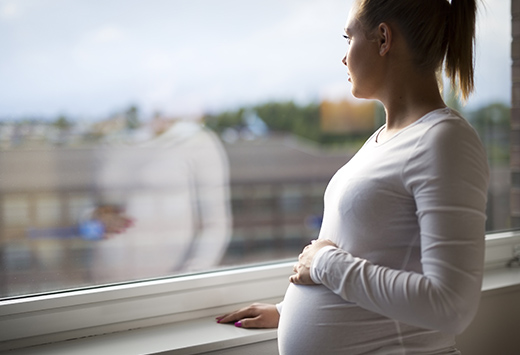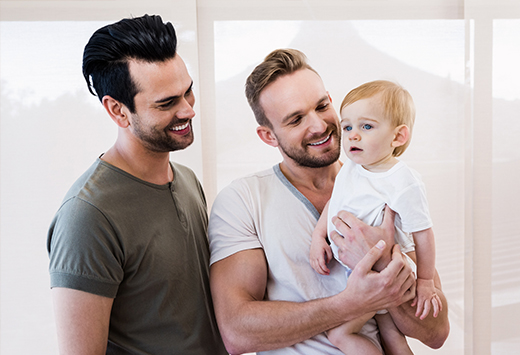If you’re a prospective adoptive parent or birthmother considering adoption, you’ve likely come across the concept of open adoption and probably curious about learning more. Open adoption is an increasingly popular approach to post-placement communication. Because of that, there are numerous studies that show the benefits and long-term effects of entering into an open adoption agreement. Read on to discover some key scientific findings about open adoption.
What is open adoption?
Open adoption is an agreement that allows for a more open relationship between birth parents and the adoptive family before and after the adoption is finalized. It allows for the free flow of communication between birth parents, adoptive parents, and adoptees at a level that everyone involved is comfortable with. Other adoption types include semi-open adoption and closed adoption, but open adoption is the most popular type in the United States.
How does open adoption work?
While every adoption is different, when it comes to open adoption there are certain aspects that are typical of open adoption arrangements. First, the birthmother will create an adoption plan with her adoption professional. In an open adoption, a birthmother has the right to choose the family she will place her baby with. Before the baby is born, there is a certain level of communication between both parties that allows everyone to get to know each other. The adoptive parents may also be informed about the birthmother’s hospital plan so they have an idea of what to expect on the big day.
Once the adoption is finalized, communication frequency and visitations will be decided on by the adoptive family and birthmother with a reasonable expectation that everyone will keep up their end of the agreement. Something to keep in mind when it comes to open adoption is that the relationships between adoptees, adoptive parents, and birthmothers are not static and will ebb and flow over time. It is important for all parties to communicate in a way that is respectful, considerate, and always in the best interest of the adoptee.
What are the benefits of open adoption?
As you will see from the scientific findings outlined below, open adoption has many benefits for the adoptees, adoptive families, and birthmothers. Just a few of these benefits include:
- The adoptive families and biological parents have the opportunity to develop a relationship with the ultimate goal of providing the adoptee with a path to a well-rounded and happy life.
- The adoptee has access to vital information about their biological parents, such as family history, health history or developments, and the reasons for the adoption taking place.
- Through open adoption, many birthmothers find closure and peace in having direct knowledge of the environment her child is being raised in and being able to maintain communication with them.
- The adoptee can have a relationship with their biological family, including extended family if it is agreed upon.
- Open adoption fosters transparency, clear communication, and a healthy expectation of boundaries between all parties.
11 Open Adoption Research Findings
- A research report released by The Evan B. Donaldson Adoption Institute found that only 5% of adoptions are closed in the United States. This indicates that open adoption or semi-open adoption are the primary approaches that adoptive parents and birthmothers decide to take. Additionally, 95% of the agencies surveyed in this study stated that they offer open adoptions, showing the growing trend towards open adoption across the country.
- Researchers at the Minnesota / Texas Adoption Research Project (MTARP) that operates out of the University of Massachusetts conducted a long-term study of the effect of adoption on identity. One of their most impactful key findings is that when having a relationship with their birth parent, the adoptive child understands there is a difference between their parents (caregivers) and their birth parents. This allows them to form a healthy sense of identity while still understanding their origins, which in turn helps their social emotional development. This finding can also help adoptive parents or prospective adoptive parents overcome any fears related to open adoption.
- Data collected during a point-in-time study of birthmothers by researchers published in the Journal of Social and Personal Relationships found that open adoption allows birthmothers to properly process their grief. In the first phase of the study (4–12 years post-placement), birthmother’s involved were found to have moderate to high degrees of grief surrounding their adoption. However, in the second phase (12–20 years post-placement), they reported some or no feelings of grief. It was found that birthmothers who engaged in open adoption arrangements tended to exhibit lower levels of grief than those who participated in closed adoption arrangements.
- A four-year study of over 700 adoptions showed that adoptive parents also have positive experiences with open adoption. By the fourth year of this study, satisfaction levels with the adoption were reported to be high, with open adoption being a primary factor in the positive outlook of their adoption.
- Another finding from a study conducted by The Evan B. Donaldson Adoption Institute in 2012 found that the following four factors are important for a successful open adoption arrangement:
- A shared understanding by birth and adoptive parents about what open adoption is and is not
- The relationship between adoptive parents, birth parents, and adoptees being based on commitment to respect, honesty, trust, and empathy
- The ability of all parties to have agency in determining and shaping the relationships and established boundaries
- An emphasis on collaborative communication between all parties including planning for contact and conveying needs
- A research study published in The National Library of Medicine shows that adoptees who have ongoing, positive contact with their biological parents are overall more satisfied than adoptees who do not. An open adoption arrangement allows them to understand why their birthmother chose adoption and promotes a healthy relationship with her, which in turn provides them with essential information to build a healthy sense of identity.
- Another study in the National Library of Medicine examined the effects of various levels of openness in adoption through the lens of adoptive family dynamics. It found that families who participated in an open-adoption arrangement showed higher levels of acknowledging the adoption, had a better relationship with their child, and had less fear that the birthmother would try to reclaim the adoptee, compared to those in closed adoption arrangements.
- When it comes to open adoption, adoptees benefit in the long-run from the concept of “communicative openness” that an open adoption creates. What this means is that because an open adoption is inherently based on open, transparent communication, adoptees feel free to discuss adoption and their feelings about adoption with their parents. A study has found that children who have an open adoption arrangement engage in healthy behaviors, have higher self esteem, trust their parents, and overall function well in their families.
- The Evan B. Donaldson Adoption Institute found that between 76 and 100 percent of birthmothers choose the adoptive parents of their baby. This is great news because it indicates that as we have progressed towards adoption that is based on openness and communication and birthmothers have more agency and control over their adoption decisions than they had in the past.
- The School of Social Work at Rhode Island College published a study that found adult adoptees between the ages of 18–23 prefer knowing who their biological parents are over not knowing. None of the participants in this particular study reported that open adoption was a major issue or point of contention in their lives.
- A 2018 study published in Families in Society journal reported that adoptees prefer having access to their birth families as it aids in self-determination, allows for healthy identity formation, and for them to be able to process their feelings surrounding their adoption in a healthy way. This indicates that open adoption is an important factor for adoptees in having a positive outlook on their adoption.
Considering Open Adoption
It is clear from the various research studies discussed above that open adoption is beneficial for everyone involved in the process, especially the adoptee who is always at the center of any adoption consideration or approach. We encourage prospective adoptive families to pursue the path of open adoption if it is something they feel comfortable with. With that said, there is no one size fits all approach to adoption, and your adoption professional will be there with you throughout the whole process to help you navigate while making the best decisions for your family.




